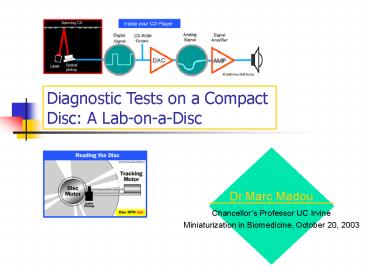Diagnostic Tests on a Compact Disc: A LabonaDisc - PowerPoint PPT Presentation
1 / 19
Title: Diagnostic Tests on a Compact Disc: A LabonaDisc
1
Diagnostic Tests on a Compact Disc A
Lab-on-a-Disc
Dr.Marc Madou Chancellors Professor UC
Irvine Miniaturization in Biomedicine, October
20, 2003
2
Outline of Presentation
- Why a CD as a Microfluidic Platform ?
- Microscope, smart centrifuge/vortex and plastic
disposable with fluid storage capability - Comparison with other microfluidic platforms
- Example Applications
- Most Recent Application Integrated Molecular
Diagnostics (DNA Arrays on a CD) - Fast hybridization detection
- Optical
- (Electrical-not covered on October 20, 2003)
- Lysis
- Lysis 1 multiplex
- Lysis 2 single circular
- This is where we are headed
- Conclusions
3
Why a CD as a Microfluidic Platform ?
- The optical disc drive is a sophisticated laser
scanning microscope designed to characterize and
identify micrometer sized features at a rate of
about a million per second (H. Kido and J.Zoval).
VOLTAGE
TIME
4
Why a CD as a Microfluidic Platform ?
DNA array
Gnat wing
White blood cells
J.Zoval and H. Kido
5
Why a CD as a Microfluidic Platform ?
- The optical disc drive is a smart
centrifuge/vortex.
6
Why a CD as a Microfluidic Platform ?
- The Compact Disc (CD) is a biocompatible solid
phase which can substitute for standard
consumables including slides, micro-wells,
centrifuge tubes.
7
Comparison with other Microfluidic Platforms
Instrument Power Propulsion Heater
(PCR) Electronics Detection
- Propulsion of fluids
- Mechanical pressure
- Electrokinetics (AC and DC)
- Centrifuge
- Acoustic
- Partitioning of functions between disposable and
instrument is very different for HTS and
Molecular Diagnostics
Disposable Reagents Fluidics
8
Comparison with other Microfluidic Platforms
- Closed Chip Electrokinetic (DC)
- l2
- Fluid contact
- First products (Caliper)
- Not generic
- May solve liquid valving but not for vapors !
- Mixing difficult to implement
- Many parameters influence propulsion force
- High voltage source is not convenient
- Better for high-throughput screening and smaller
samples
9
Comparison with other Microfluidic Platforms
- Centrifugal
- l3
- No fluid contact
- Established
- Generic
- Solves liquid valving elegantly
- Widest dynamic range
- Simple and inexpensive CD player for drive
- Mixing easy to implement
- Most functions demonstrated
- Cell work easier
- Sample preparation easier
- Better for diagnostics
10
Example Applications
- Sample metering,
- Mixing,
- Washing,
- Sample splitting,
- Molecule separation
- Centrifuge,
- Two-point calibration,
- Metering,
- Fast Immuno-assays,
- Fast DNA- assays,
- Dead/live tests
11
Fast DNA Hybridization Detection
- Problem Time consuming hybridization caused by
slow diffusion of DNA molecules in passive DNA
array approaches - How to speed up hybrdization ?
- Electrophoretic
- Convection
- Diffusion
Out
Cathode
Cathode
Anode
Anode
DNA injection
12
Fast DNA Hybridization Detection
13
Fast DNA Hybridization Detection Optical
- Hybridization in a constrained column using CD
platform for sample and reagent propulsion
- The flow cell consists of a hybridization column
1, hydration buffer chamber 2, sample chamber 3,
and two rinse chambers 45. The sample and the
wash buffers were delivered by centripetal force
in the desired sequence achieved by manipulating
the balance between the capillary force and
centripetal pressure. The hydration buffer flows
through the hybridization column to hydrate the
array, followed by the flow of the sample in
chamber 3. The wash buffer in chamber 45 passes
through the column after the hybridization
reaction to wash out the non-specifically bound
targets.
14
Fast DNA Hybridization Detection
- The figure (a) on the left shows the results of
hybridization on the CD. A spinning velocity of
450 RPM was used (corresponding to the flow rate
ranging from 0.65 uL/min to 1.3uL/min). The
figure compares a non-specific sequence ssDNA (i)
with specific sequence ssDNA (ii) hybridization
experiment. Green fluorescence is only seen on
the pads with specific sequence ssDNA on it.
Figure (b) shows the magnified results of c-ssDNA
hybridization. Hybrdization in minutes instead of
hours!
15
Lysis-1 Multiplex design
- Motivation To extract DNA from cells in a CD
platform - Ultimate goal To integrate the whole DNA
detection process from sample preparation to DNA
detection into a single CD
16
Lysis-2 Circular design
17
Lysis-2 Circular design
- Type Chinese Hamster Ovary (CHO-K1)
- Size 10 µm
- Glass Beads 100 220 µm
- No. of Rotation Cycles 300 (5 min.)
- DNA concentration measured using PicoGreen
- Quantitation Kit
18
This is where we are headed
- Cells are cultured
- Live/dead viability assay for cell quantization.
- Cells are lysed, nucleic acids are purified and
mixed with RNAase inhibitor, calibrants, and
reporters. - Fast hybridization using flow-through column
19
Conclusions
- Diagnostics as a powerful new application of a
very mature and well established technology CD,
DVD, etc. - Sample to answer for molecular diagnostics in a
hand-held is not about if but when
--microfluidics will make it possible and the CD
approach has the most features that fit the
applications need. - Your reject CDs (AOL, Barry Manilow, the Bee
Gees,)may have some use after all. Put blood on
the tracks !































